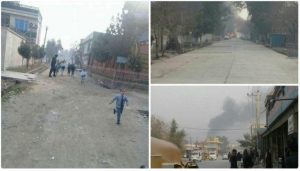The Gone Childhood with Kites
We have killed Kaveh Ahangar and waken up Zahhak-e Maardoosh with our fanaticism and ethnicity.

Where our Juvenility is. In which summer, we have left out our childhood. In which summer, we have fastened our childhoods with the string of kites and have trusted the southern, eastern, northern and western winds, sending it to the sky with the promise of fall rains. In which game, did we left our childhood dreams. Which childhood games have been serious for us that eventually led to war?
Where is our childhood? With which legacy of our father did we exchange it? Father, who left nothing for us except war, bullet, and travel as a memorial!
I ask you, elders! Where is our childhood? I am the same child who grew up as quickly as explosions, bullets, and suicides! We are the same children of immigration, war, and bullets.
The kites returned with (F-16). Our baby dolls again survived with open eyes, although whatever ruins were poured on their heads. Our crickets changed to “stinger” and our balls to the heads of our playmates!
War was our unwanted legacy; the inheritance, we had to accept and it seems to be reaching out to our children.
The story is that war takes most casualties from children. They spend their childhood as quickly as bullets. A child, who has no ethnic but forgetfulness. Children who taste the war in Jalalabad like their sister Tabassum. Children in Jalalabad tasted the war like the six-year-old raped girl in Badakhshan province.
We have faced an enemy that does not have mercy on anything. An enemy of our inability, an enemy of concealed unconscious bias in every stratagem of our war-torn minds. If the game of fanaticism and ethnicity would not revive, there would no enemy. These days of Afghanistan’s “Zahhak-e Maardoosh” is the result of murdering “Kaveh Ahangar” in the spirit and our childhood stories. We have killed Kaveh Ahangar and waken up Zahhak-e Maardoosh with our fanaticism and ethnicity.
We feed the snakes on the shoulder of Zahhak by giving our heads every day.
Translated by Taher Mojab